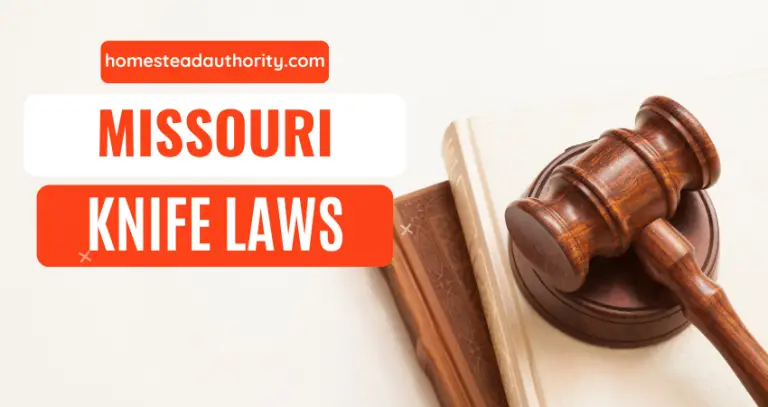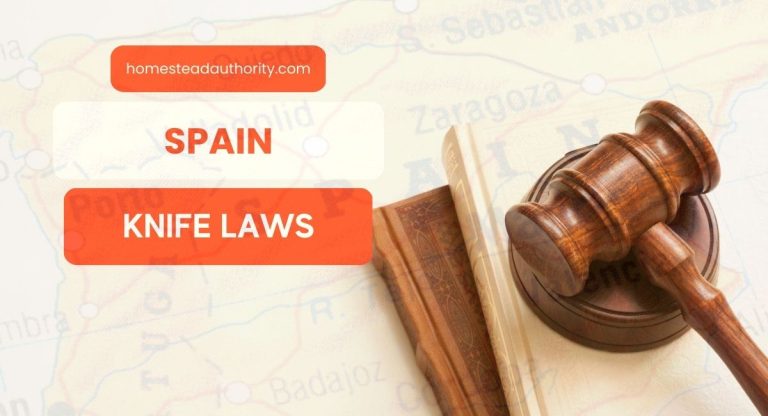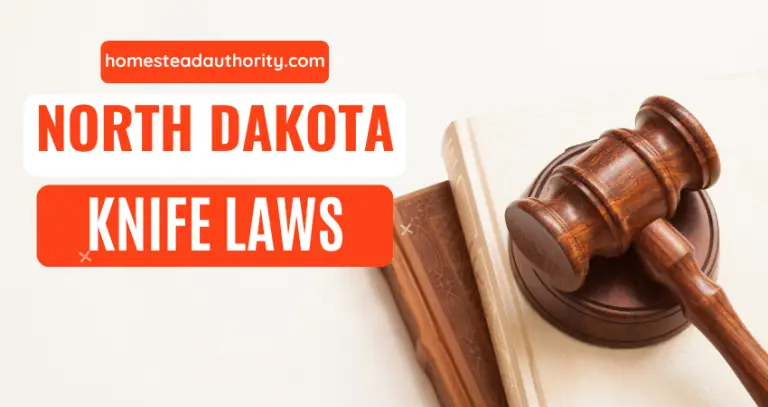Navigating Texas Knife Laws: What You Need to Know
There’s no restriction on knife types or how they’re carried in Texas. So open or concealed carry isn’t an issue here.
The only restriction for knives in the state is based on their blade length. Texas specifies a legal knife length of 5 ½ inches for adults and juveniles.
So anyone (adult or juvenile) can carry a knife with a blade shorter than 5 ½ inches anywhere in the state.
The adults can also legally carry location-restricted knives anywhere in the state, except the restricted locations like schools, state capitols, courthouses, and more.
However, juveniles under 18 can own them at home or in their vehicles but can’t carry them in public except in a few specific cases.
Texas also has a statewide preemption, restricting local governments from adopting new knife regulations.
Continue reading the article to find out what else Texas Knife Laws include.
Legal Facts At A Glance
You can have a quick look at the legal facts about knife laws in Texas below.
Preemption
Texas has a statewide preemption repealing ordinances from local governments more restrictive than state law.
Open Or Concealed Carry
No restrictions apply.
Critical Dimensions
Adults can carry knives with blades over 5 ½ inches in non restricted areas, while minors can’t carry these knives anywhere except for a few specific cases.
No-Go Zones
Location-restrict knives can’t be carried to schools, state buildings, and courthouses, followed by an extensive list of places.
List Of Illegal Knives In Texas
Before 2013, Texas had restrictions on a few specific types of knives, including automatic knives. But in 2013, things started to change as the repeal of Texas’ switchblade restriction was enacted.
Two years later, in 2015, the statewide Knife Law Preemption was enacted to remove all local knife restrictive ordinances stricter than Texas state law.
In 2017, with the signing of the HB 1935 bill, all the “illegal knives” in Texas law to date were removed.
Ever since, the Texans can legally carry a dagger, bowie knife, and virtually any knife they want.
Although there’s no restriction on knife types in Texas, a few restrictions exist based on other factors that we’ll be talking about next.
Relevant Statutes
Before we move the discussion forward, take a brief look at the relevant statutes related to knife laws in Texas.
§ 46.01 includes the definition of knife and location–restriction knife in Texas.
§ 46.02 includes the list of unlawful carrying of knives, especially related to minors.
§ 46.03 Includes places where weapons, including a knife, are prohibited
§ 46.06 includes the illegal transfer of certain weapons, including knives, to minors
§ 46.15 Includes exceptions and non-applicability
Knife Restrictions In Texas
Texas upholds the knife rights of its citizens. However, there are a few restrictions based on three factors: blade length, minor or person under 18, and restricted locations. Let’s check them out in detail below.
Restriction Based On Blade Length
Texas has repealed knife laws that were based on the shape/style of blades and the opening mechanism of the knife.
Now the legal status of knives in Texas is solely based on the blade length.
So what size knife is legal to carry in Texas? The knife length is based on the Texas Judicial Precedent, and here’s the lawsuit to check out McMurrough v. The State of Texas, 995 SW 2d 944 (1999).
It’s measured in a straight line extending from the point of the blade to the most forward part of the hilt.
Section § 46.01(06) states the legal knife length is 5 ½ inches. It means you can legally carry a knife in Texas anywhere if the length of the blade tip to the handle isn’t more than 5 ½ inches.
Anything over that measurement will be considered a location-restricted knife.
Restriction Based On Locations
There’s no restriction for knives having a blade length less than 5 ½ inches for persons under 18 years of age in Texas.
The knife restrictions apply to minors for location-restricted knives that have a blade length of more than 5 ½ inches.
There are two parts to this restriction.
- One part considers the illegal carry of location-restricted knives for minors, subject to some exceptions.
- Another part considers illegal sell, supply, or offer to sell/supply location-restricted knives to minors, except for a few exceptions.
Restriction On Carrying Location-Restricted Knives For Minors
According to section § 46.02 (a4) in the Texas legislature, minors under 18 aren’t allowed to carry a location-restricted knife (having blade length over 5½ inches) knowingly, intentionally, or recklessly except for a few cases.
If a person under 18 is reported for doing so, he or she will commit an offense and may be charged with a Class C misdemeanor.
Some exceptions are mentioned in the law, where the person can be exempted from penalty if the location-restricted knife is carried:
- On the person’s own (own-controlled) property or premises
- In a motor vehicle/watercraft owned (or controlled) by the person or while directly en routing (going in or coming out) to the motor vehicle/watercraft.
- Under parent or legal guardian’s supervision
Restriction On Selling Or Supplying Location-Restricted Knives To Minors
According to Texas law section § 46.06 (a2), it is illegal to sell, supply, or even offer to sell or supply location-restricted knives to anyone under 18.
Anyone doing so will commit a Class A Misdemeanor, except for certain exceptions.
Section § 46.02 doesn’t apply if the parent or legal guardian gives written permission for the sale of a knife or provides ‘effective consent to a non-sale transfer of the knife to the minor (according to section § 46.06 (c)).
Section § 46.02 doesn’t apply to persons under 18 if he or she uses a location-restricted knife to engage in some outdoor pursuits (as outlined in section § 46.15) where it’s commonly used.
Some of these include lawful fishing, hunting, or a sports activity on the immediate premise it’s conducted. The exception also stays if the actor is an route between the residence, watercraft, or motor vehicle and the activity premises.
Restriction Based On Locations
Texas includes a massive list of places where location-restricted knives (one having a blade over 5 ½ inches) is prohibited. The portion of section § 46.03 talks about Places Weapons Prohibited.
Let’s check out where location-restricted knives and other prohibited weapons can’t be carried.
- Property of schools or educational institutes and on passenger vehicles of schools and educational institutes
- Professional Sporting Events, including School, Collegiate, and Interscholastic Events
- County Courthouses or Court Offices
- Polling Places on Election Day
- Airports’ Past Security Screening
- Premises of Racetracks
- Within 1,000 feet of the Premises used as a Place of Execution by the Texas Department of Criminal Justice on the Day of Execution
- Establishments like Bars or Restaurants Deriving an Income of More than 51 percent from the Sales of Alcoholic Beverages and which have a RED 51-percent Sign Posted
- Correctional Facilities
- Healthcare Facilities, including Hospitals, Mental Hospitals, and Nursing Homes
- Amusement Parks
- Churches, Synagogues, and Established Places of Worship.
The only exception is written authorization or permission from the concerned authority. Also, carrying a location-restricted knife to the above places is considered a punishable offense.
Taking location-restricted knives or prohibited weapons to schools or educational institutes is a 3rd-degree felony.
If a person commits it in places except for schools or educational institutes, they may be charged with a class C misdemeanor.
Exceptions In Texas Knife Laws
Many varied classes of employees from the state and local government, military personnel, and ‘first responders’ are partially or entirely exempted from sections 46.02 and 46.03 based on the provisions of § 46.15.
So the knife restriction laws don’t apply to:
- Peace Officers or Special Investigators
- Parole Officer while in Compliance with Policies and Procedures Adopted by the Concerned Department
- Officers from Community Supervision and Corrections Department with Proper Authorization
- Retired Personnel from Different Departments like the Retired Peace Officers, Law Enforcement Officer, Federal Criminal Investigators, and Reserve Law Enforcement Officers with Required Certification
- Attorney General, US Attorney, District Attorney, Criminal District Attorney, Assistance Criminal District Attorney, or Assistant County Attorney
- A Ballif Designated by An Active Judicial Officer having Proper License or Engaged in the Escort of the Judicial Officer
- Authorized Juvenile Probation Officer
- Authorized Volunteer Emergency Service Personnel
- Authorized Personal Protection Officer
Texas Statewide Preemption
Texas statewide preemption went into effect after the Knife Law Preemption bill, HB 905 signed on June 17, 2015. The preemption repeals ordinances from counties or municipalities more restrictive than state law.
It also ensures that the repeal of the state ban on automatic (switchblade) knives is the law throughout Texas.
Texas has statewide preemption law regarding knives that restricts local governments from adopting regulations related to:
Possession, Transfer, Carrying or Wearing of knives in Parades, Public Parks, Political Rallies, or Public Meetings.
The law allows local Governments to adopt regulations in cases:
Which requires the residents or public employees to go armed for self or national defense, enforce the law, or implement other lawful purposes.
In that case, such an admirable regulation could specify knives.
Of Riots, Insurrections, or Natural disasters where local governments think the regulation is required to protect public health & safety.
As discussed above, a regulation requiring local residents to go armed may obviate such a necessity.
Penalties And Punishment For Carrying Illegal Knives
Compliance with the Texas knife law is far more compassionate than in most other states.
Generally, the Texas penalties or punishments for non-compliance are also quite realistic.
Let’s look at the legal consequences associated with these non-compliances.
Penalty For Violation Of Locations With Location-Restricted Knife Or Minor Possessing Location-Restricted Knife
Two offenses related to knife restrictions in Texas have the same penalty.
Firstly if a person under 18 violates section 46.02 by willful possession of a location-restricted knife without exceptions discussed above, he or she’ll commit a Class C Misdemeanor.
The same offense level applies to the location violations under section 46.03, except for school or education institute-related locations.
The Class C Misdemeanors associate a maximum penalty of a fine not exceeding $500 and no collateral disqualifications.
Penalty For Entering School Or Educational Institute Property With A Location-Restricted Knife
The violation of section 46.03 involving a school or educational institution location is a 3rd-degree felony.
It’s associated with a punishment of imprisonment in the Texas Department of Criminal Justice for a term not above ten years or not below two years.
Final Words
Texas ensures knife liberty for its citizens with great flexibility in the knife laws and by enacting a statewide preemption. It also doesn’t distinguish between open or concealed carry in the state.
If you’re an adult, you can virtually carry any type of knife anywhere in the state, except “Places Weapons Prohibited.” So be careful about carrying location-restricted knives in certain areas like schools, bars, restaurants, prayer houses, courthouses, etc.
Juveniles should only carry a knife with a blade shorter than 5 ½ inches. If they need to use location-restricted knives (ones over the specified length), they should do it under parental supervision or only in cases they’re allowed.
The transfer of these knives is also restricted to minors in Texas. There are some small restrictions in the state and Texans should abide by them to avoid legal consequences.







